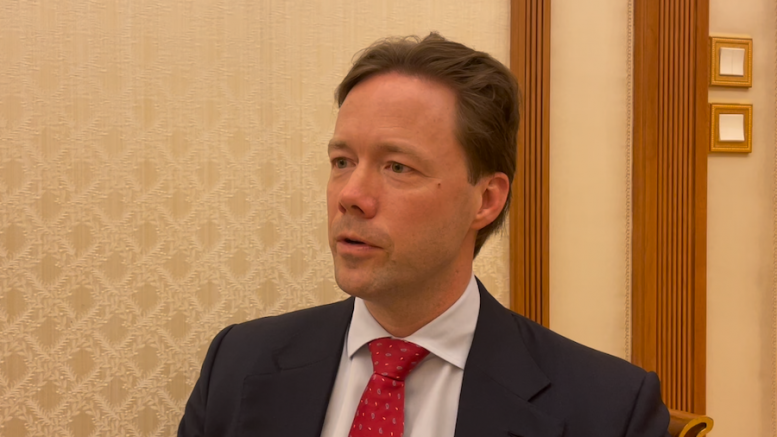Eurasian Resources Group has signed deals to explore in Saudi Arabia with a Mars rover-like sampler as it helps prepare a passport for electric vehicles showing their battery mineral sources.
The Luxembourg-based company, which is 40%-owned by the Kazakhstan government, agreed on Wednesday with Saudi state-owned miner Ma’aden to search for copper, nickel, lead, zinc and rare earths, chief executive officer Benedikt Sobotka said in an exclusive interview with The Northern Miner on the sidelines of the Future Minerals Forum in Riyadh on Jan. 12.
“This region has been underexplored and of course geologically this is elephant country in the same area as the Nubian shield,” Sobotka said on Thursday. “For the first time we’re going to use a remote-operated vehicle, which is very exciting because it will save a tremendous amount of time.”
The unlisted company, with 2021 revenue of US$8.5 billion, will deploy the sampler called Nomad to survey, analyze soils on the spot and transmit results to handlers. Its round-the-clock operation will cover some six belts of opportunity initially mapped by Saudi Arabia.
Sobotka, chairman of the Global Battery Alliance, a network of governments, industries and watchdogs promoting corporate social responsibility (CSR) in mineral sourcing, is to announce a new vehicle passport to that effect next week at the World Economic Forum in Davos, Switzerland. Tesla and Volkswagen will also join the passport system, which will check off greenhouse gas emissions, human rights records and environmental protections, he said.
“It will help trace materials for the end consumer that go into the electric vehicle,” the chairman said. “It’s a combination of provenance and CSR rating which will make the composition of the battery transparent.”
Saudi Arabia itself plans to develop enough renewable capacity by 2035 to power about 17 million homes as the Middle East begins to embrace the clean energy transition.
Double cobalt output
Eurasian, which has about 70,000 employees across 20 countries, also mines battery metals in Kazakhstan and a slew of African nations. It produced 1.54 million tonnes of ferroalloys and 20,700 tonnes of cobalt in 2021, according to a company sustainability report.
The miner is starting construction within a year to double its cobalt production in the Democratic Republic of the Congo by 2027 while it further explores its 2,000-sq.-km holding in the country’s southern Katanga province, Sobotka said.
“It will be required, because just in cobalt the industry will have to build 30 to 40 mines in the next 10 years,” the CEO said. “The energy transition for the minerals and metal industry is the biggest purchase order in history because of the sheer amount of volume that’s going to be required.”
The global mining industry spends less than US$100 billion a year on capital projects compared with the oil and gas sector’s US$2.2 trillion annually, according to S&P Global. Achieving clean energy goals is going to require fundamental shifts in investing not just in dollar terms, but in attitudes to mining and the talent needed, Sobotka said.
“We’re talking about high-grade nickel, manganese and cobalt, materials that are not easy to mine and process. And they tend to be in jurisdictions that are not easy to work in,” Sobotka said.
“The future elephants are all going to be outside the established jurisdictions and we’re very comfortable working in these regions,” he said. “We as an industry have to be much more bold when it comes to making commitments to new countries.”
Indonesia on deck
Kazakhstan itself has had its share of turmoil. President Kassym-Zhomart Tokayev invited Russian-led troops a year ago to quell riots that stemmed from fuel price hikes before spreading.
The largely undeveloped DRC has been notoriously difficult to govern, with thousands of artisanal miners in the country’s east controlled by rival militia groups, some sponsored by neighbouring countries.
Now, Eurasian is considering Indonesia, which has a fifth of global reserves of nickel, but has restricted the export of raw materials to force companies to build factories in the sprawling, third-most populous country. There are also concerns about who will succeed President Joko Widodo next year and if nearby China will exert undue influence in the new cold war for critical minerals.


Be the first to comment on "Eurasian Resources expands search for EV minerals in Saudi Arabia"